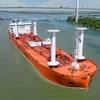European Commission – Shipyard Aid
The European Commission has concluded, following four years of investigation, that state aid granted to Gdynia shipyard and Szczecin shipyard gives rise to disproportionate distortions of competition within the Single Market, in breach of EC Treaty state aid rules, and must be repaid.
The Commission has simultaneously agreed to accept commitments from Poland for the implementation of the decisions in a way that will quickly create opportunities for viable and sustainable economic activities at the Gdynia and Szczecin sites and so maximize the number of sustainable jobs there. In particular, the Polish authorities have committed to sell the yards' assets through open, transparent, non-discriminatory and unconditional tenders and subsequently liquidate the Gdynia and Szczecin shipyard companies, claiming the state aid back through this process. As a result, companies acquiring the assets will not be liable to repay the illegal subsidies, even if they choose to continue shipbuilding. To help any workers that are made redundant, the Commission has offered assistance in devising flanking measures under existing EU programs (European Social Fund or European Globalization Adjustment Fund).
Commission President José Manuel Barroso said "We have worked long and hard to find a solution that is fair and sustainable. For the workers and businesses in Poland, but also for people working and doing business elsewhere. The solution that we have agreed with the Polish authorities offers the best possible prospects for future jobs and viable activities at these historic sites".
Competition Commissioner Neelie Kroes commented: "I am confident that this solution will maximize opportunities for viable economic activity to continue at these historic sites, with good prospects for sustainable jobs there, while putting an end to the disproportionate distortion of competition caused by the huge subsidies received by these shipyards in recent years. This solution has been made possible by the very positive cooperation we have enjoyed with the Polish Government in recent weeks. I can well imagine that the buyers of certain assets would want to engage in shipbuilding at the sites, and that would not be a problem for the Commission because there would be no new subsidies and they would buy the assets at a market price. And if those acquiring the assets want to pursue other economic activities than shipbuilding, they must be allowed to. What matters most is the break with the past, viable economic activity at these sites and sustainable jobs."
Since 2002, Gdynia Shipyard benefited from various aid measures (in particular capital injections, loans and tax write-offs) amounting to $900.5m and from production guarantees of $1,178.6m (both in nominal value). Szczecin Shipyard received aid of $1.3b as well as production guarantees of $896.7m (again, in nominal value). The decisions require that Poland recovers from the yards all state aid unlawfully granted since May 2004.
The two yards have been in difficulties since the 1990s. In April 2004, Poland notified restructuring aid for the two yards and the Commission opened formal investigations in June 2005 (see IP/05/644). Poland submitted restructuring plans for both yards in September 2005 and September 2006, both with substantial delays. None of the plans would have ensured long-term viability to the yards and the restructuring would have been financed entirely by state aid.
In December 2006, Poland decided to privatize the shipyards, a process, delayed several times, that eventually progressed in the course of the year and lead to potential investors submitting restructuring plans for the two yards on 12 September 2008. The plans represented an improvement in comparison to previous versions. However, despite further large amounts of state aid and substantial job losses foreseen in these plans, the yards would still not have been commercially viable. The Commission therefore concluded that the subsidies received by the Gdynia and Szczecin shipyards did not comply with the guidelines on rescue and restructuring aid but rather constituted illegal operating aid. The Commission decision requires repayment of the illegal aid.
Asset sale
In order to reduce the potential negative social and regional effects of these decisions, the Commission agreed with Poland on specific modalities of implementation, along the model developed in the recent Olympic Airways decision (see IP/08/1336). Poland has submitted that it needs to take legislative action to implement the sale of assets.
Poland committed that the recovery will be implemented by way of a sale of assets or small bundles of assets in an open, transparent, non-discriminatory and unconditional tender. The proceeds from the sale of the assets will be used to repay creditors, including the recovery claim of the state related to the unlawful aid. The existing companies owning the yards, with the remaining assets and liabilities, will be liquidated.
The assets have to be sold at market price to the highest bidder. The tender must be non-discriminatory, ensuring access to all profiles of potential buyers, irrespective of the purpose of their investment. No conditions can be attached to the tender (for example, a requirement that a bidder purchases all the assets of a given yard). The sole award criterion for the selection of the winning bid will be revenue maximization for the benefit of the yard's creditors. An automatic transfer of employees to the new economic activity cannot be imposed. Any write-off or repayment of public or private liabilities, financed by the State, would amount to additional state aid and could not be accepted. All creditors and clients must be treated in the same way as they would be in the framework of insolvency procedures. The sale must be conducted by an independent sales administrator under the close supervision of the creditors ensuring that it is conducted on market terms. In addition, Poland and the Commission will appoint jointly a monitoring trustee with the specific task to verify that the sale and the recovery of the aid take place in full compliance with the decisions. Poland committed to complete the sale by the end of May 2009.
Poland was assured in a letter from Commissioner Kroes that, provided that these conditions are respected, this sale would not be considered to involve new aid to buyer(s) of the yards' assets and the assets could be transferred to the buyer(s) free of any liability concerning the reimbursement of unlawful state aid. The buyers of the assets could therefore restart economic operations without the burden of the past and in the absence of any limitation concerning their future activity.
(http://europa.eu)










